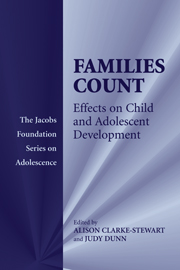Book contents
- Frontmatter
- Contents
- List of Contributors
- Introduction
- PART ONE RISK AND RESILIENCE
- 1 How Families Matter in Child Development: Reflections from Research on Risk and Resilience
- 2 The Promotion of Resilience in the Face of Adversity
- 3 Identifying Risk and Protective Factors for Healthy Child Development
- PART TWO PEERS AND PARENTS
- PART THREE WORK AND FAMILY
- PART FOUR DISCORD AND DIVORCE
- PART FIVE NEW AND EXTENDED FAMILY FORMS
- PART SIX CONCLUSIONS AND COMMENTARIES
- Index
- References
1 - How Families Matter in Child Development: Reflections from Research on Risk and Resilience
Published online by Cambridge University Press: 05 June 2012
- Frontmatter
- Contents
- List of Contributors
- Introduction
- PART ONE RISK AND RESILIENCE
- 1 How Families Matter in Child Development: Reflections from Research on Risk and Resilience
- 2 The Promotion of Resilience in the Face of Adversity
- 3 Identifying Risk and Protective Factors for Healthy Child Development
- PART TWO PEERS AND PARENTS
- PART THREE WORK AND FAMILY
- PART FOUR DISCORD AND DIVORCE
- PART FIVE NEW AND EXTENDED FAMILY FORMS
- PART SIX CONCLUSIONS AND COMMENTARIES
- Index
- References
Summary
Throughout the history of child development, the family has played a ubiquitous role in theory, research, practice, and policy aimed at understanding and improving child welfare and development. From grand theories to heated controversies, family processes and roles have been invoked in numerous ways in developmental science over the past century to explain or debate whether and how families matter (Collins, Maccoby, Steinberg, Hetherington et al., 2000; Maccoby, 1992). Psychoanalytic theory (Freud, 1933/1964; Munroe, 1955), attachment theory (e.g., Bowlby, 1969, Carlson & Sroufe, 1995; Sroufe & Waters, 1977), ecological and developmental systems theory (e.g., Bronfenbrenner, 1979, Ford & Lerner, 1992; Sameroff, 2000), family systems theory (Davies & Cicchetti, 2004; Fiese, 2000; Fiese & Spagnola, in press), social learning and social cognitive theory (Bandura, 1977, 2001; Gewirtz, 1969), coercion theory (e.g., Patterson, 1982), parenting styles theory (Baumrind, 1967, 1973), and a variety of other influential frameworks have emphasized the family in diverse ways. Theories about the origins of competence and about the origins of psychopathology also have focused on family roles and processes (Cummings, Davies, & Campbell, 2000; Fiese, Wilder, & Bickham, 2000; Masten & Coatsworth, 1995; Masten, Burt, & Coatsworth, in press).
- Type
- Chapter
- Information
- Families CountEffects on Child and Adolescent Development, pp. 5 - 25Publisher: Cambridge University PressPrint publication year: 2006
References
- 90
- Cited by

